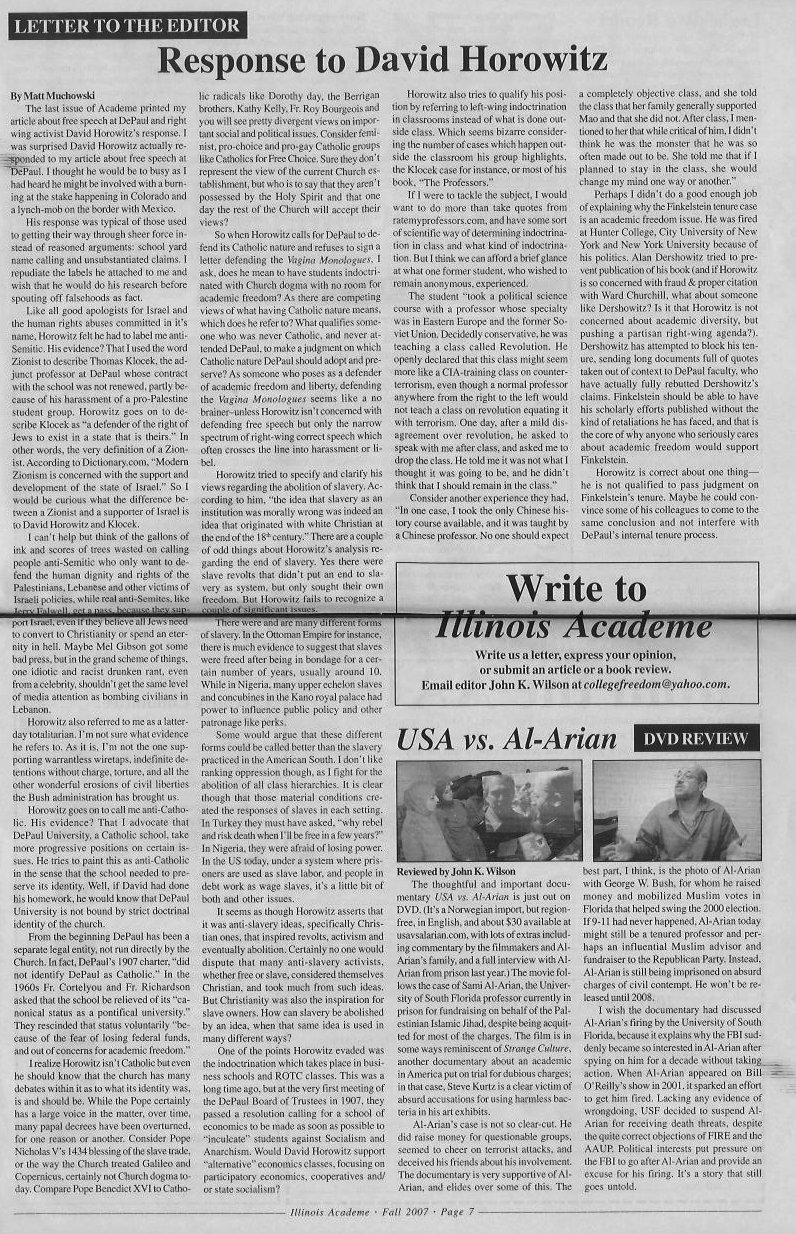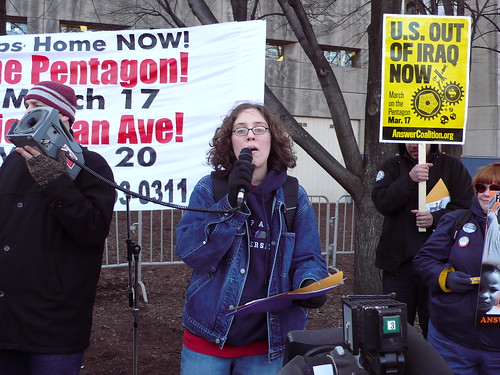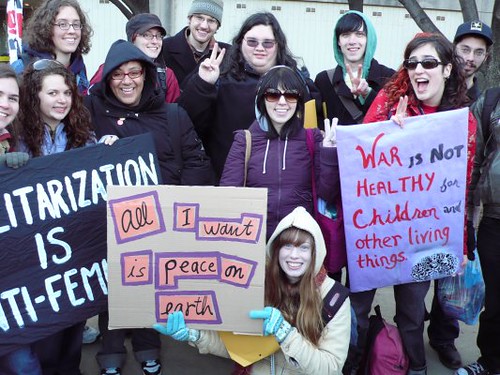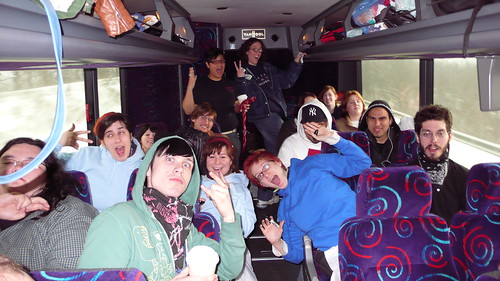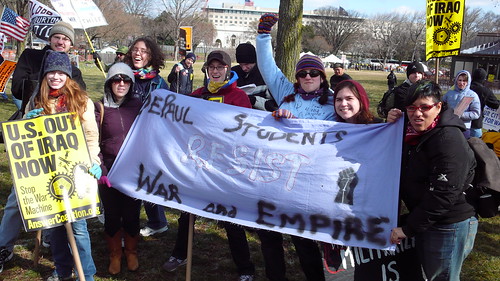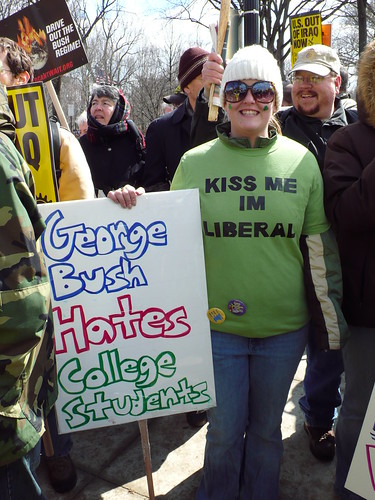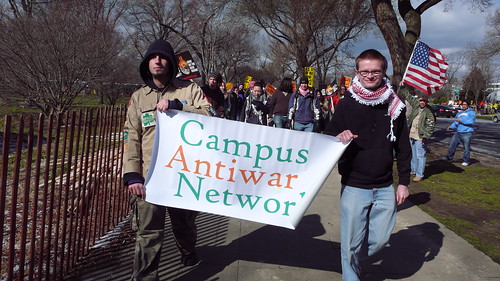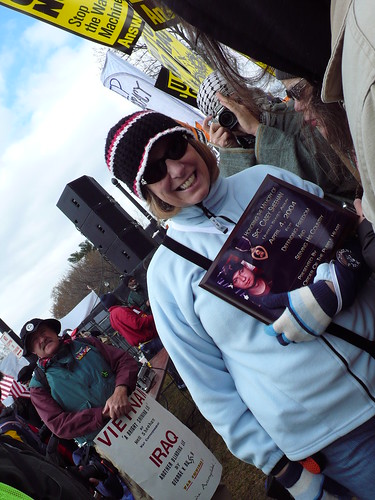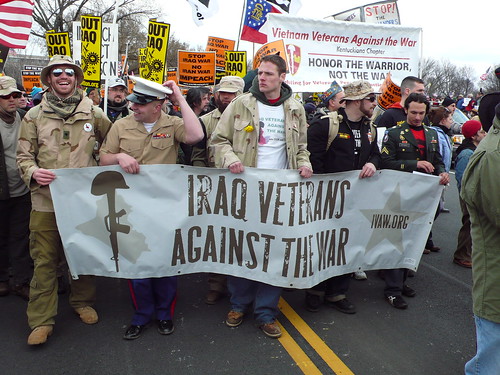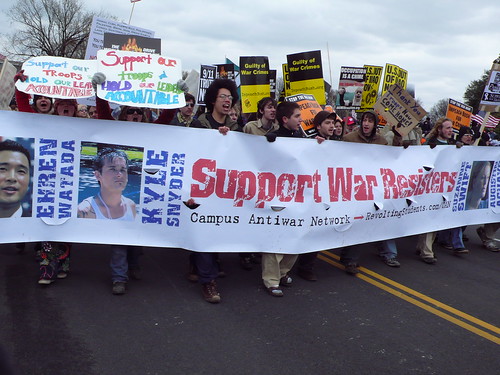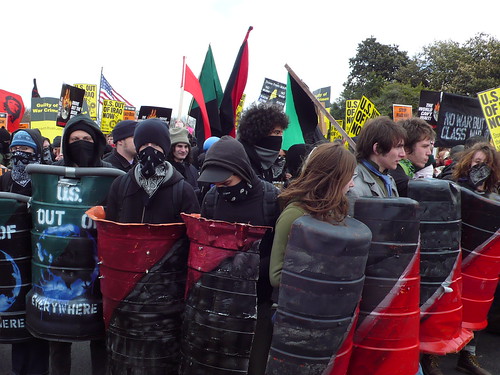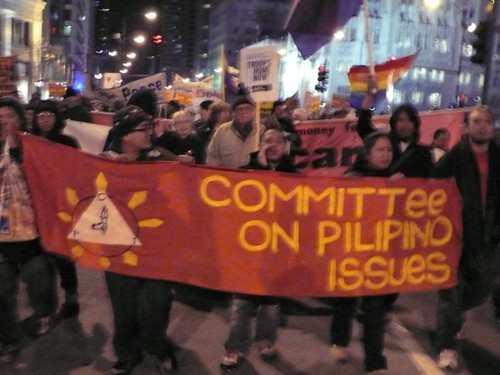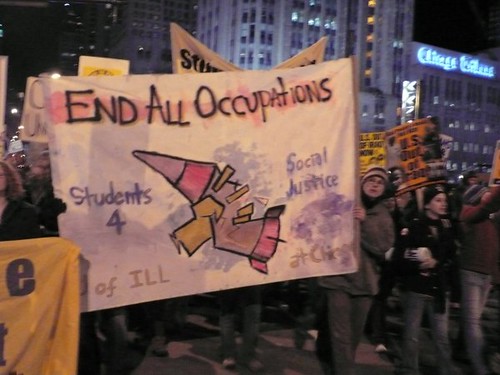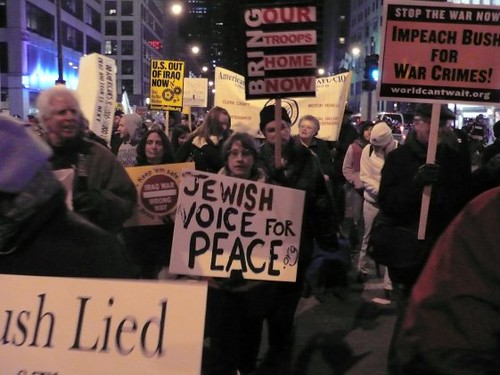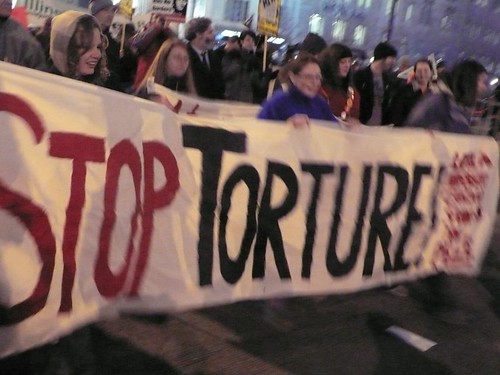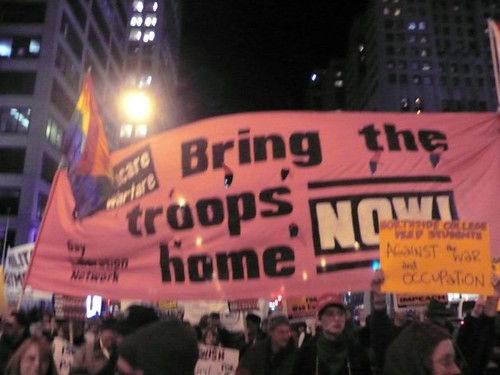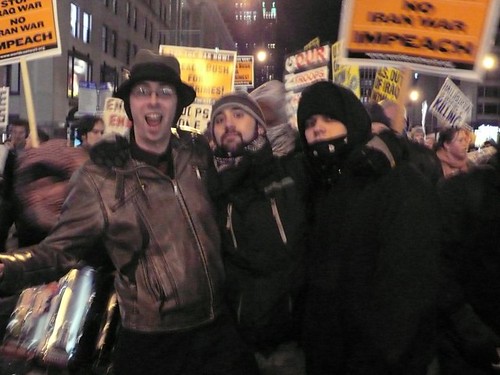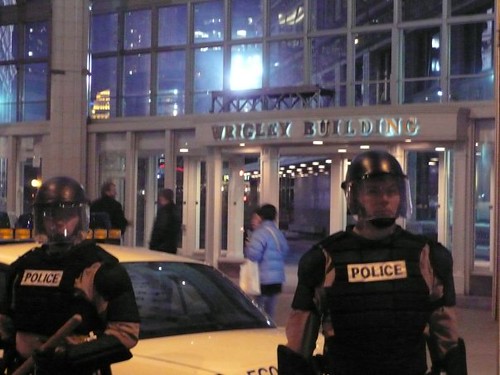This article was written by my friend Raechel Tiffe for a class and we published it the Spring 2007 issue of Raise the Fist. Since she mentions a forum that I moderated, I have included it on this blog.
____________________________________________________________________________________________________
I went to this conference about activism and Latin America. It was required for my Indigenous Political Struggles class, but I ended up being so so glad that I went. It was really amazing; I explain some of the highlights below!
Rufino Dominguez-Santos “Los Indigenas Migrantes Oaxaqueños en el Activismo Binacional”
Rufino Domniguez-Santos spoke to us on behalf of his organization General del Fretne Indgigena de Orginazaciones Binaconales (FIOB), an organization dedicated to bettering the lives of indigenous peoples in Oaxaca. Dominguez-Santos spoke about the way his group has made an effort to gain US support in the struggle for indigenous rights. He explained that the US has been notorious for anti-immigrant policy, and that because of this, FIOB and other immigrant-rights supporters created what has since been called “the Immigrant’s Spring” due to the intensive rallies and marches on US soil. He noted that while indigenous migrants have to work for peace and justice, that it is more difficult to be an activist under the conditions they endure in Mexico: disappearances, threats, violence, etc. He then spoke about Oaxaca, and the violence that ensued this past fall after the teachers union went on strike and rallied in the streets. In response to this APPO (Popular Assembly of the People of Oaxaca) organized to exercise their political power so the US government would stop being repressive, but, he said, they have yet to gain the rights they have demanded. He concluded by requesting our support and to stand in solidarity with the movement. During the question and answer session, Dominguez-Santos addressed several important points, one being something we continued to hear throughout the conference: Immigration will not stop while injustice is being perpetuated in Mexico.
“CASA-HGT (Center for Autonomous Social Action-General Brotherhood of Workers) and the Immigrants Rights Movement.”
The first man to speak was Carlos Arango, of Casa Atzlan. He gave a brief history of CASA, explaining that Hugo Sanchez created the organization in an effort to gain unlimited amnesty for all undocumented workers. This, Carlos explained, was the only way to resolve immigrant issues. He went on to explain the way there was tension between the AFL-CIO and Cesar Chavez’s Farmworker Alliance against the idea of immigrant rights, since both groups believed that undocumented workers took jobs away. While CASA was able to change the minds of the Farmworkers, the AFL-CIO unions were still stuck in their ways. He went on to talk about the creation of the Declaration of Immigrant Workers, and the way CASA put together an agenda of issues, including: family, uncondtional amnesty, bilnigual education, and labor rights. He also stated that it is their goal to have a bill in Congress, and see then how Democracts and Republicans react to it, to determine the “lesser of the evils.”
Juan Torres, DePaul professor, spoke next, also giving a history of the movement. He focused a lot on the “Immigrant’s Spring” of 2006, explaining that the media had labled them a “sleeping giant” claiming they were big in numbers, but weak in political strength. The massive marches and protests last spring proved that incorrect. He went on to posit that CASA is actually the foundation and catalyst of the immigrant movement. He explained that CASA contriubted several things to the movement: the rejection of the term “illegal alien” and encouraged instead “undocumented worker”; the idea of “sin fronteras”; amnesty for all undocumented workers; and the implementation of a Latino Studies proram at universities.
“Engaging the Border in Chicago: An Ethical Issue.”
I was completely moved and inspired after this panel that showcased the reflections of five students who had participated in a study abroad program that enabled them to visit the border of Mexico and Arizona. The first student, Bobby, spoke about the approach he took to service. He said he researched in preperation, took action, and, most importantly, took time for reflection. He said that it was during reflection that the students were able to talk about and reconcile their guilt over what they were seeing and the fact that they can go back to comfortable lives. He concluded by saying that sometimes he feels as though any kind of service is worthless, but then said that he (like Mike who puts out the water) at least knows that he is doing his part.
Emily spoke about NAFTA and the way the agreement and globalization have negatively impacted the workers in Mexico. She noted that the two main industries in Mexico—Agriculture and Manufacturing—are being exploited by US free-trade policy. She also spoke about the maquila’s, and explained that 40% of the labor force work in these exploitative factories. One of the most upsetting statistics she shared was that after NAFTA was implemented, 82% of the population now lives in poverty.
Travis spoke about his trajectory of social activism, including: “transcending, humanity is restored, ethical indignation, social injustice exposed, results in dialogue, and a project is created in the community.” What he focused on most were concepts discussed in Paulo Friere’s Pedagogy of the Oppressed; the main message of both Friere’s book and Travis’ talk was that the oppressed should not become the oppressor, but rather liberate the oppressor by restoring their humanity. He also spoke of the transformation from experiencing “the other” as an intellectual experience, to making it a visceral one. He noted that we must expose injustice to the light of human concious (paraphrasing Dr. Martin Luther King, Jr.), but also pointed out that not everyone who will witness these injustices will be inspired to create change, and that the real task is trying to figure out how to deal with that issue.
Alejandro’s presentaion about creative resistance reflected on the way art has been a form of challenging the dominant oppression and also dealing with the pain of the border; there is art both on the border and about the border. He suggested that the wall acts as a symbol that divides the physical, spiritual, social, and cultural.
Billie was the final student to speak, and her reflection focused on the lack of Black/Latino alliances. In discussing the fact that many reacted dubiously to her presence as a black woman at the wall, she challanged the audience to think about how we can develop a transcommunal identity. She encouraged intentional dialogue amongst black and Latinos.
Finally, Mike, a Native American activist who puts out water at the border, discussed the need to have a moral response to injustice.
“Audiovisual Radicalism”
This panel was full of very interesting human beings who have done a significant amount for the progressive movement. The first speaker was Carlos Flores, a photographer who began taking pictures in 1969 when the Young Lords began. Flores says he takes pictures as a way of developing certain conciousness’ for different communities, and specifically focused on black and Latino youth alliances. He also showed a video performance of an 11 year old girl’s oral history project about the Young Lords rise of power. Devorah Heitner presented a paper entitled “Inside Bedford Stuyvesant” which examined a black community in the 60’s that used a television program to reclaim a voice. She explained that the media was (and still is) a powerful tool for creating social change. Michael James, the co-founder of The Heartland Cafe, spoke next. He discussed his history in getting involved with the movement as starting during his college years when he wanted to help build coalitions amongst different racs. He then began to utilize newspapers as his main tool of social change, and began to have significant success with this when he moved to Uptown in Chicago to work with the Join Community Union, an organization of activists in solidarity with the working class. He said there are two important things to remember when asessing the media as a tool: 1) “Freedom of the press to those who own one.” 2) “You have to educate to liberate.” After several revolutionary/radical papers, James began the Heartland Cafe as a community space and restaurant that would serve as a meeting place for activists and organizers, and also serve wholesome food. The final speaker was Bernardo Navia who gave a very moving talk about his experience as an immigrant from Chile in the US. He explained that the language barrier between English and Spanish speakers was isolating and harmful to immigrant identity. He saw the Spanish language as the immigrant’s “country, a reality where one can exist.” He helps publish Spanish-language literary publications that he views as a reflection of the the lost “Latin spirit.”
DePaul Activism: Before and After Graduation
This panel was very inspiring to hear for me as a DePaul student activist. Matt Muchowski discussed the book he is working on entitled “A People’s History of DePaul” about DePaul activism, and gave a brief but thorough overview about some of the discriminatory policies of DePaul in the past, and how students have worked to elliminate them, and also the way student movements have impacted the world more broadly, even outside the DePaul campus. He referenced both of the other panelists, James Hammonds and Victoria Romero. Hammonds was the founder of the original Black Student Union, which he explained as beginning due to a lack of black resources, a lack of black students, and consistent discrimination from the school and students. The group had many victories, including the occupation of the SAC pit. He noted that activists “must have it in their genes, because anyone would be crazy to chose activism.” Victoria Romero was very moving, and spoke as one of the co-founders of DALE (Depaul Alliance for Latino Empowerment). She graduated from DePaul in 1994 and discussed the way the buzzword “multiculturalism” when first introduced was extremely problematic. DePaul seemed to push this idea on students of color, but never really took into account what it meant; all the rules about how to educate multiculturalism was decided by white men. She noted the way DALE occuppied an office, and ultimately got the Cultural Center built as a space for students of colors and allies to come together, discuss ideas, and organize in a comfrotable environment. She also discussed her experience as an activist community organizer in Pilsen. As a board member of the Pilsen Alliance, Romero has made great efforts to help the community resist gentrification. One of the best points she made was that the Saul Alinsky model of organizing does not work for communities of color, and that there has to be another way, suggesting that being an activist “in an acedemic way” has been helpful. She said that Chicago is no longer reacting to marches and sit-ins, but they need researched evidence presented in a formal manner to see change accomplished.
“Los pueblos indígenas y las Mujeres en el marco de la Reforma del Estado: Martha Sanchez”
Martha Sanchez spoke to us about the demands of indigenous people in Mexico. Among them being territory, autonomy, self-determination, and access to resources. She discussed the ways in which groups and organizations have attempted to work within the system by appealing to the government, and creating formal forums. Unfortuantely, these tactics have not been very successful. She also talked about other methods of resistance and change, specifically metioning radio as being a very powerful tool; however, the ability to get access to air waves is difficult, and therefore it has not been utilized much. She also said that another important use of media is through video documentation of both the violence and injustice against women and also the ways in which they are resisting and organizing against it. She then focused on women’s issues within the indigenous community, as it is important to her to get the women’s voice heard in the public sphere. One of the messages she stressed throughout the talk was teh importance of alliance-building. She concluded that the indigenous women “could not move ahead without help” and because of that there has been an attempt to build coalitions with other movement-sympathetic women/feminist groups.

